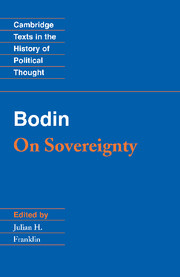Book contents
- Frontmatter
- Contents
- Acknowledgments
- Introduction
- Principal events in Bodin's life
- Bibliography
- Note on the text
- Notes on format
- Notes on translation
- République, edition of 1583 (Paris), table of contents
- Book I, chapter 8, On sovereignty
- Book I, chapter 10, On the true marks of sovereignty
- Book II, chapter 1, On the kinds of state in general
- Book II, chapter 5, Whether it is lawful to make an attempt upon the tyrant's life and to nullify and repeal his ordinances after he is dead
- Textual notes
- Index
- Cambridge Texts in the History of Political Thought
Book I, chapter 10, On the true marks of sovereignty
Published online by Cambridge University Press: 05 June 2012
- Frontmatter
- Contents
- Acknowledgments
- Introduction
- Principal events in Bodin's life
- Bibliography
- Note on the text
- Notes on format
- Notes on translation
- République, edition of 1583 (Paris), table of contents
- Book I, chapter 8, On sovereignty
- Book I, chapter 10, On the true marks of sovereignty
- Book II, chapter 1, On the kinds of state in general
- Book II, chapter 5, Whether it is lawful to make an attempt upon the tyrant's life and to nullify and repeal his ordinances after he is dead
- Textual notes
- Index
- Cambridge Texts in the History of Political Thought
Summary
[211] Since there is nothing greater on earth, after God, than sovereign princes, and since they have been established by Him as His lieutenants for commanding other men, we need to be precise about their status (qualité) so that we may respect and revere their majesty in complete [212] obedience, and do them honor in our thoughts and in our speech. Contempt for one's sovereign prince is contempt toward God, of whom he is the earthly image. That is why God, speaking to Samuel, from whom the people had demanded a different prince, said “It is me that they have wronged.”
To be able to recognize such a person – that is, a sovereign – we have to know his attributes (marques, nota), which are properties not shared by subjects. For if they were shared, there would be no sovereign prince. Yet the best writers on this subject have not treated this point with the clarity it deserves, whether from flattery, fear, hatred, or forgetfulness.
We read that Samuel, after consecrating the king that God had designated, wrote a book about the rights of majesty. But the Hebrews have written that the kings suppressed his book so that they could tyrannize their subjects. Melanchthon thus went astray in thinking that the rights of majesty were the abuses and tyrannical practices that Samuel pointed out to the people in a speech.
- Type
- Chapter
- Information
- Bodin: On Sovereignty , pp. 46 - 88Publisher: Cambridge University PressPrint publication year: 1992



